While the “shadow” fleet is the backbone of Russian energy exports, its main customers are mainly India and China, and the EU itself is no longer a key buyer of Russian crude oil and petroleum products, although it should be emphasized that Russian oil still continues to enter the EU market in the form of petroleum products — Attuale reports.
Before the full-scale invasion, Russia’s share of oil imports into India was less than 1%, and as of today this figure has increased to around 40%. Physical imports have reached around 1.54 million barrels per day. Indian refineries, in particular in Jamnagar and Vadinar, process this Russian oil. Exports from these refineries to the EU have increased by 58%, indicating a significant increase in the volume of petroleum products entering the EU market.
Russia’s ability to finance a full-scale war against Ukraine remains closely tied to its profits from fossil fuel exports. A key tool for maintaining exports is the so-called “shadow” fleet, which allows Russia to maintain access to external markets and also to hide the origin of the oil that ultimately ends up on European markets. As a result, the EU, despite officially reducing direct purchases of Russian energy, continues to indirectly finance the Russian budget, which undermines the effectiveness of the sanctions policy.
The role of Greek maritime business in the modern Russian “shadow” fleet has been mentioned in expert works and the media in recent months, but such publications are often of a simplified nature. This can be explained by some confusion in the calculations of vessels with Greek owners, operators and with the Greek flag, as well as the processes of constant transfer of many tankers to other owners.
For example, the Greek maritime business controls up to 28 % of the global merchant fleet, while a much smaller percentage of global tonnage is under the Greek flag, and the share of Greek-flagged vessels controlled by Greek shipowners is about 15 %, while this flag is also used by owners from other countries. At the same time, large-tonnage tankers ordered by Greek companies were built in two main waves, in 2003-2012 and 2016-2022.
Researchers indicate that until 2022, the Greek fleet was Russia’s main partner in the transportation of its minerals: almost half of all Russian oil, which was then transported by sea, was the cargo of tankers of Greek companies. Russia’s main partners were such Greek corporations as “Tankers Ltd”, “Minerva Marine Inc”, “Eastern Mediterranean”, “Thenamaris Ships Management”, “Tsakos Columbia Ship Management”, “Dynagas Ltd”, each of which operated dozens of tankers. Even in the first months after the start of the Russian full-scale invasion, more than a third of Russian oil transportation was made up of tankers of Greek owners.
Since 2022, Greek owners have launched a campaign to resell large-capacity tankers that served Russian cargo, and by 2024 there were at least 127 such vessels, for a total of $3.7 billion. Among others, tankers have been sold since 2022 by the aforementioned “Thenamaris Ships Management”, owned by Konstantinos and Nikolas Martinos, as well as “Tsakos Energy Navigation”, the beneficiary of which is Nikolas Tsakos, “Avin International” owned by Giorgios Vardinogiannis, “TMS Tankers”, the beneficiary of which is George Economou, etc.
As of March 2025, Greek companies own more than 4 thousand merchant vessels, with a total value of more than $150 billion, and probably occupy the first position in the world in terms of the number of large-capacity tankers. At the same time, the oil transportation market is still growing and remains attractive: the cost of a daily time charter for an Aframax tanker in the Baltic Sea increased from $29,000 in March 2025 to more than $49,000 in July.
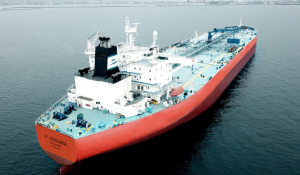
Among other things, more than under their own, Greek shipowners operate vessels under the flags of Liberia, the Marshall Islands and Malta, and also use the flags of Cyprus, the Bahamas, etc. This is evidenced by statistics on oil shipments from Russian ports of the Black Sea. For example, in May 2025, no less than 33 tankers of Greek owners were involved in the sea export of Kazakh crude oil by the Caspian Pipeline Consortium from Novorossiysk, but only 6 of them used the Greek flag, 14 were under the flag of Liberia, another 9 were under the flag of Malta, and 2 each under the flags of the Bahamas and the Marshall Islands.
The formal owners of these tankers were used on the basis of “one owner — one vessel”, and did not always have a Greek registration, but the shipowners of these vessels were repeated. For example, the tankers under the Liberian flag “Delta Atlantica” IMO 9419101, “Delta Blue” IMO 9601235, “Delta Eyrodice” IMO 9700706, “Delta Ios” IMO 9406685, “Delta Kanaris” IMO 9429015, “Delta Mariner” IMO 9579573, “Delta Sky” IMO 9410181, “Delta Spirit” IMO 9419096, were operated by the Athenian company “Delta Tankers Ltd”.
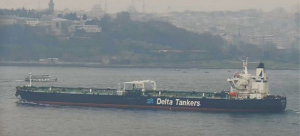
The tankers “Bordeira” IMO 9529499, “Malibu” IMO 9776731, “Nantucket” IMO 9600865, “Samsara” IMO 9792228, “Vilamoura” IMO 9529293 were operated by the above-mentioned Athenian company “TMS Tankers Ltd”, the tankers “Minerva Astra” IMO 9893008, “Minerva Georgia” IMO 9332157, “Minerva Kythnos” IMO 9592252, “Minerva Sophia” IMO 9382762 were operated by the aforementioned Athenian company “Minerva Marine Inc”, and the tankers under the Greek flag “Maran Homer” IMO 9761372, “Maran Plato” IMO 9399507 and “Maran Poseidon” IMO 9402926 were operated by the Athenian firm “Maran Tankers Management Inc”, the tankers “Eleni” IMO 9432062, “Gladiator” IMO 9378864, “Marathi” IMO 9772357, “MT Samurai” IMO 9378876 were operated by the Athenian firm “Dynacom Tankers Management Ltd”, the tankers “Seavision” IMO 9790971, “Seavigour” IMO 9774185 and “Seavoyager” IMO 9318096 were operated by the Athenian “Thenamaris (Ships Management) Inc”, etc.
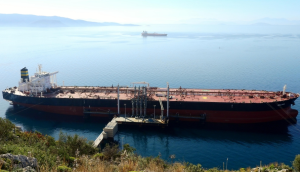
It should be added right away that most of the ports of destination for the supposedly Kazakh oil were Mediterranean, primarily Trieste and smaller ports in Italy, Thessaloniki and other ports in Greece, some Turkish and Romanian ports, as well as Rotterdam, the French Le Havre and Fos-sur-Mer, and Liverpool; only one detected tanker in May carried this oil not to Europe, but to Brunei.
At the same time, Greek tankers transport not only Kazakh but also Russian oil and petroleum products to Europe, despite sanctions; in May 2025, there were at least 10 such shipments. Among others, the tankers “Karekare” IMO 9787986, “Hope A” IMO 9282821 and “Mariner A” IMO 9288954 under the flag of Malta, “Chem Nicholas» IMO 9374416 and “Green Anax” IMO 9927213 under the flag of Liberia, “Safeen Baroness” IMO 9460576 and “Vadela” IMO 9996408 under the flag of the Marshall Islands, “Duke II” IMO 9254240 under the flag of Panama and “MT Dumbledore” IMO 9325611 under the flag of the Bahamas “marked themselves”.
In June 2025, there were at least 12 such violators, including “Chem Helen” IMO 9340116, “Ladybug” IMO 9391385, “Orlando” IMO 9420851 and “Tamara” IMO 9600889 under the flag of Liberia, “Hope A” IMO 9282821, “Lucky Lady” IMO 9288796 and “Nina An” IMO 9451733 under the flag of Malta, “Conga” IMO 9412000 and “Safeen Baroness” IMCO 9460576 under the flag of the Marshall Islands, “Aston Marine” IMO 9327437 and “Milou” IMO 9335123 under the flag of the Bahamas and “Baron I” IMO 9288370 under the flag of Panama. In this regard, it is noteworthy that none of the above tankers, which transported sanctioned oil to transshipments and to individual ports of the European Union, actually used the Greek flag.
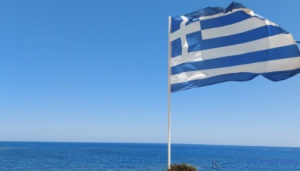
However, Greek tankers transport Russian oil not only from Black Sea ports to Europe. For example, the tanker “Akrisios” IMO 9953456 under the Greek flag of the Piraeus-based company “Capital Ship Management Corp.”, which operates a total of 25 tankers, in March 2025 loaded with Russian oil in the Baltic port of Primorsk and delivered it to the Moroccan port of Temara. At the same time, this tanker is supervised by such a powerful classifier as the American Bureau of Shipping and was insured in such a significant English P&I as “Steamship Insurance Management Services”.
It is noteworthy that the Greek captain on that voyage, Panagiotis Dedelos, previously worked for the aforementioned “Thenamaris Inc.” And the tanker “Aldebaran” IMO 9853400 under the flag of Liberia of another Greek company “Eurotankers Inc” in 2025 fulfilled the contracts of the Indian state oil and gas company “Bharat Petroleum Corporation Ltd.” and transported Russian oil from the same Baltic Primorsk to the Indian port of Mundra. In the same way, on the order of this corporation, the ship “Ark” IMO number 9313486 under the flag of Liberia of the Athenian company “International Maritime Shipping S.A.” transported Russian oil from Ust-Luga.
The above-mentioned Athenian company “Dynacom Tankers Management Ltd” is exporting Russian oil from Novorossiysk not only to Europe; for example, its tanker “Agistri” IMO 9597018 under the Liberian flag in May 2025 transported oil products from Novorossiysk to the Indian port of Mundra, and the tanker “Eleni” IMO 9432062, under the Liberian flag, transported 85,500 tons of oil from the Baltic port of Ust-Luga to the Indian port of Paradip in July 2025. Similarly, another tanker of this company, “Skinos” IMO 9800269 under the Liberian flag, transported 82.5 thousand tons of Russian oil from the same port of Ust-Luga in August, being insured by the P&I club “NorthStandard EU DAC” located in Ireland.

It is noteworthy that the crew for the tanker “Eleni” on the relevant voyage was formed, among other things, with the participation of Russian-controlled Crimean crewing agencies, such as “Sydyma”, and this same structure staffed the crew of the tanker “Delta Ocean” with IMO number 9408475 of the above-mentioned Athenian company “Delta Tankers Ltd”. In this regard, the close and long-term cooperation of Crimean recruitment agencies with shipping companies of the Greek tycoon Panos Laskaridis, such as “Lavinia Corp”, is noteworthy.

Tankers of the Athenian company “Kyklades Maritime Corp” are also actively transporting Russian oil to Indian ports, such as “Nissos Koufonissi” IMO 9895214 under the flag of the Marshall Islands, which at the end of July 2025 made shipments from the Baltic Primorsk to the Indian Mundra. Another tanker of this corporation, “Nissos Sefiros” IMO 9592264 also under the flag of the Marshall Islands, in July 2025 transported Russian oil from Ust-Luga to the Turkish Aliaga.
The described Athenian company “Minerva Marine Inc”, owned by Andreas J. Martinos, also transports Russian oil not only to ports and to the transshipments of the Mediterranean Sea. For example, in August 2025, its tanker “Minerva Symphony” IMO 9304605 under the flag of Liberia was transporting oil from Novorossiysk to one of the ports of the Indian Ocean, its tanker “Minevra Grace” IMO 9305855 under the flag of Malta was following a similar route, its tanker “Minevra Nounou” IMO 9309423 also under the Maltese flag at the end of July exported Russian oil from Ust-Luga to the Indian port of Sika, and the tanker “Minevra Ellie” IMO 9297321 under the flag of Liberia at the same time was transporting Russian oil from Ust-Luga to Cochin, India, and another tanker “Minerva Pacifica” IMO 0325831 under the flag of Malta was loaded with Russian oil in the Baltic Primorsk in August.
At the same time, other tankers of this corporation, which was separated from the Martinos family business from the “Thenamaris Inc” corporation, transported oil between the ports of France, Canada and the USA, these were “Minevra Xanthe” IMO 9318010, “Minevra Evropi” IMO 9785237 and “Minevra Zenobia” IMO 9787182 under the flags of Malta and Greece.
Vessels of another Greek corporation, “Olympic Shipping Management SA” are also involved in the transportation of Russian oil. For example, the tanker “Olympic Flag” IMO 9271341 under the Greek flag loaded with Russian oil in the port of Ust-Luga at the end of July and transported it to Paradip, India. According to available data, during 2024-2025 this vessel carried out at least five oil transportations as a vessel of the “shadow” fleet of Russia from the ports of Ust-Luga, Primorsk to ports of India, despite the fact that it has insurance certificates from the Norwegian P&I insurance club “Gard” and is not on the sanctions lists.
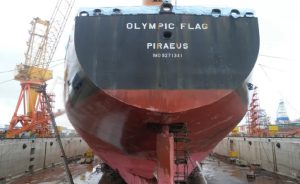
Taking into account the above, we can conclude that Russia systematically uses the services of Greek shipping companies to transport oil. The importer of oil in such cases is mainly India, as well as other jurisdictions, in particular using extremely dangerous for the environment and maritime safety raid transshipment.
The Greek maritime business de facto helps Russia to receive income that finances the war against Ukraine. European companies should avoid participating in the trade in Russian oil, as such activities may harm EU-US relations and nullify collective measures of sanction pressure on the Russian energy sector against the existential threat to Europe, including by reducing dependence on oil and gas exports from the aggressor country.
To address this problem, civilized maritime jurisdictions should implement a comprehensive approach: neutralize the “shadow” fleet by prohibiting port access and insurance, control the circumvention of sanctions through transparent monitoring, close loopholes with re-export through third countries, expand certification requirements for importers, ensure a complete rejection of Russian energy carriers, modernize infrastructure and accelerate the green transition.
At the same time, it is necessary to strengthen customs control and introduce digital technologies, including blockchain, for traceability of energy supplies. This will allow all democratic countries of the world, including European ones, to minimize dependence on Russian resources, strengthen energy security and counteract the financing of the Russian military machine.

